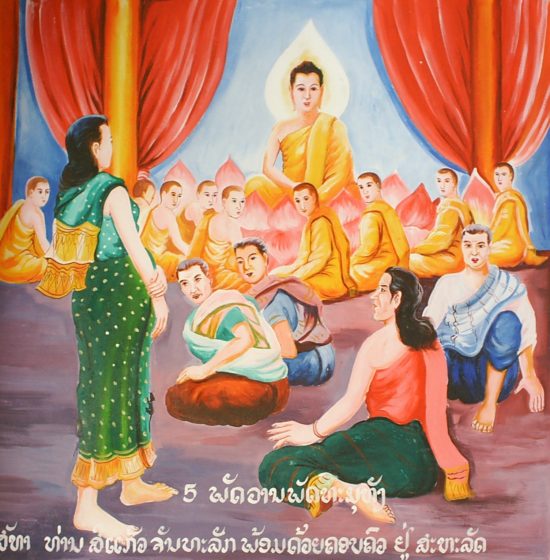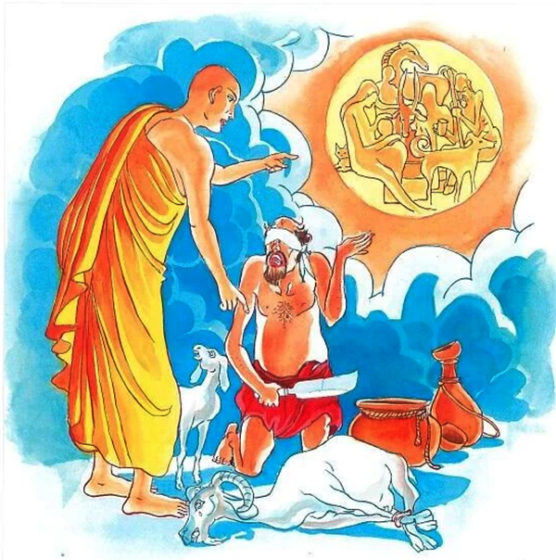Verse 176: For one who transgresses the Truth, and is given to lying, and who is unconcerned with the life hereafter, there is no evil that he dare not do.
The Story of Cincamanavika
While residing at the Jetavana monastery, the Buddha uttered Verse (176) of this book, with reference to Cincamanavika.
As the Buddha went on teaching the Dhamma, more and more people came flocking to him, and the ascetics of other faiths found their following to be dwindling. So they made a plan that would harm the reputation of the Buddha. They called the very beautiful Cincamanavika, a devoted pupil of theirs, to them and said to her, “If you have our interests in your heart, please help us and put Samana Gotama to shame.” Cincamanavika agreed to comply.
That same evening, she took some flowers and went in the direction of the Jetavana monastery. When people asked her where she was going, she replied, “What is the use of you knowing where I am going?” Then she would go to the place of other ascetics near the Jetavana monastery and would come back early in the morning to make it appear as if she had spent the night at the Jetavana monastery. When asked, she would reply, “I spent the night with Samana Gotama at the Perfumed Chamber of the Jetavana monastery.” After three or four months had passed, she wrapped up her stomach with some cloth to make her look pregnant. Then, after eight or nine months, she wrapped up her stomach with a round piece of thin wooden plank; she also beat up her palms and feet to make them swollen, and pretended to be feeling tired and worn out. Thus, she assumed a perfect picture of a woman in an advanced stage of pregnancy. Then, in the evening, she went to the Jetavana monastery to confront the Buddha.
The Buddha was then expounding the Dhamma to a congregation of bhikkhus and laymen. Seeing him teaching on the platform, she accused the Buddha thus: “O you big Samana! You only preach to others. I am now pregnant by you, yet you do nothing for my confinement. You only know how to enjoy your self!” The Buddha stopped preaching for a while and said to her, “Sister, only you and I know whether you are speaking the truth or not,” and Cincamanavika replied, “Yes, you are right, how can others know what only you and I know?”
At that instant, Sakka, king of the devas, became aware of the trouble being brewed at the Jetavana monastery, so he sent four of his devas in the form of young rats. The four rats got under the clothes of Cincamanavika and bit off the strings that fastened the wooden plank round her stomach. As the strings broke, the wooden plank dropped, cutting off the front part of her feet. Thus, the deception of Cincamanavika was uncovered, and many from the crowd cried out in anger, “Oh you wicked woman! A liar and a cheat! How dare you accuse our noble Teacher!” Some of them spat on her and drove her out. She ran as fast as she could, and when she had gone some distance the earth cracked and fissured and she was swallowed up.
The next day, while the bhikkhus were talking about Cincamanavika, the Buddha came to them and said. “Bhikkhu, one who is not afraid to tell lies, and who does not care what happens in the future existence, will not hesitate to do any evil.”
Then the Buddha spoke in verse as follows:
Verse 176: For one who transgresses the Truth, and is given to lying, and who is unconcerned with the life hereafter, there is no evil that he dare not do.
Dhammapada Verse 176
Cincamanavika Vatthu
Ekam dhammam atitassa
musavadissa jantuno
vitinnaparalokassa
natthi papam akariyam.
Source: Tipitaka








